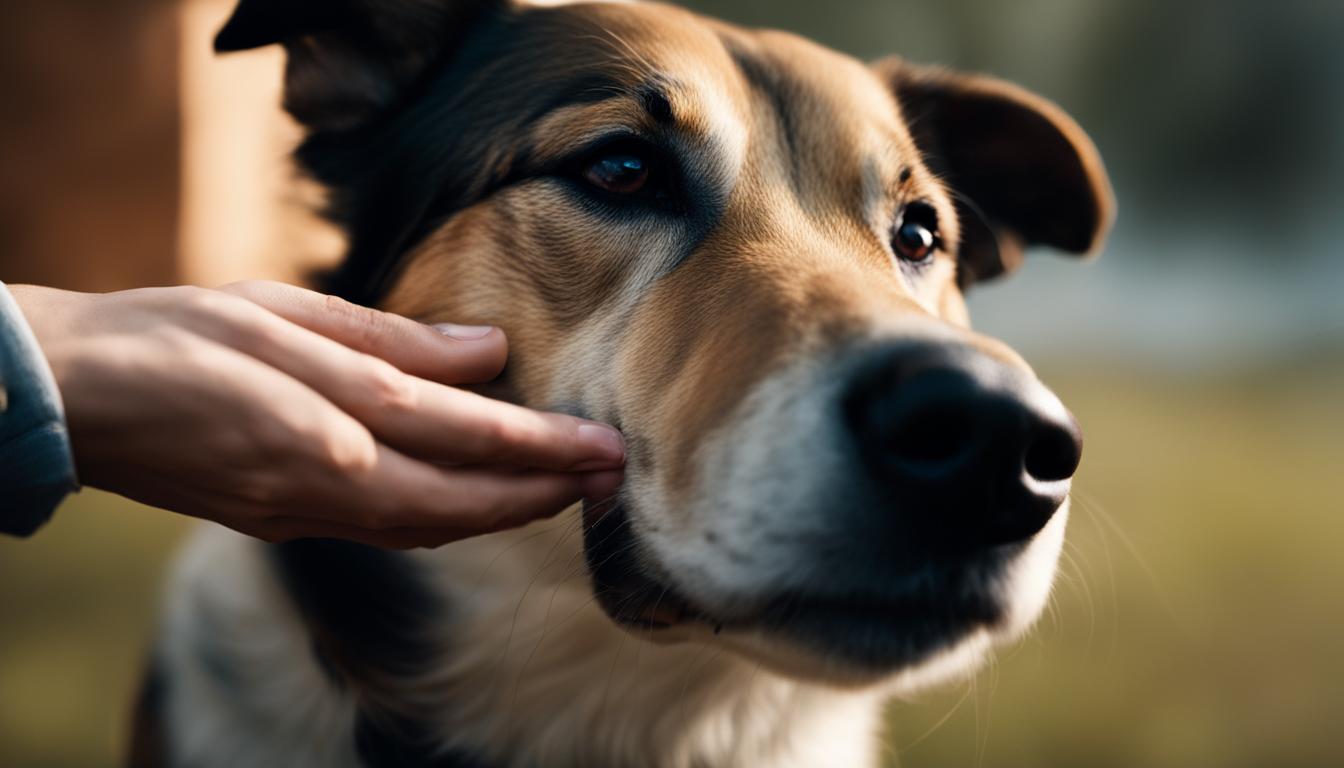Have you ever wondered Why Does My Dog Sniff My Belly Button? You're not alone! Many dog owners have observed this quirky behavior in their beloved pets. While it may seem strange to us, sniffing the belly button is a natural canine behavior with its own set of fascinating reasons.
Canine behavior is influenced by various factors, including their strong sense of smell and instinctual habits. Dogs use their sense of smell as a primary way to gather information about the world around them. Sniffing is a natural behavior that allows them to communicate, understand their environment, and gather information about other animals, objects, and even humans.
When it comes to belly button sniffing, dogs are attracted to the scents and tastes that can be found in this area. The belly button can accumulate dirt, sweat, oils, and even fungal or bacterial infections, all of which produce odors that dogs find intriguing. Additionally, dogs have a keen sense of smell and can detect hormonal changes in the body, such as during pregnancy, which may be another reason they are drawn to the belly button.
It's important to keep your belly button clean and hygienic, as dogs may become persistently interested if there are any signs of infection or health concerns. If you notice redness, swelling, pain, or any unusual discharge, it's essential to seek medical attention to address the issue.
Key Takeaways:
- Dogs have a keen sense of smell and use it to gather information about their environment and communicate with humans and other dogs.
- Sniffing behaviors, including sniffing the belly button, are natural for dogs and allow them to explore and understand their surroundings.
- The odors found in the belly button can be intriguing to dogs, as it can accumulate dirt, sweat, oils, and even potential infections.
- Dogs can detect hormonal changes in the body, which may explain their attraction to the belly button, especially during pregnancy.
- It's important to keep the belly button clean and monitor it for any signs of infection or health concerns, seeking medical attention if necessary.
Canine Behaviors and Sniffing Habits
Dogs have a highly developed sense of smell, which they use as a primary way to gather information about the world around them. Sniffing is a natural behavior for dogs and serves several purposes, including communication and environmental understanding. By sniffing, dogs can gather valuable information about other animals, objects, and even humans. It is through their sense of smell that dogs interact with their surroundings and other living beings.
Dogs use their olfactory abilities to communicate with each other and to understand their environment better. Different scents hold various meanings for dogs and act as a form of canine communication. They can detect important information about another dog's age, health, reproductive status, and even emotional state through their sense of smell. Similarly, when a dog sniffs a person's belly button, it can be a way for them to gather information about that person's unique scent and any changes in hormonal levels that may occur.
Sniffing the belly button can hold significant significance for dogs in understanding their human owners. Dogs can detect and interpret subtle changes in body chemistry, which may indicate various emotional or physical states. Thus, belly button sniffing can provide insights into a person's well-being and help dogs establish a deeper connection with their owners.
Understanding canine behavior, particularly their sniffing habits, is crucial for dog owners to create a healthy and enriching environment for their furry companions. By appreciating the role of sniffing in a dog's life and communication, we can better respond to their needs and deepen our bond with these remarkable creatures.
The Attraction to Belly Button Odors
Dogs are naturally curious creatures with a keen sense of smell. When it comes to belly button sniffing, they are particularly drawn to the unique odors that can be found in a person's navel. Why is that? Let's dive into the reasons behind their attraction.
The belly button is a warm and damp area of the body that tends to accumulate sweat, oils, and dirt throughout the day. These substances create distinctive smells that dogs find intriguing. Just as we are captivated by pleasant scents, dogs are also fascinated by the aromas emanating from our bellies.
In addition to the buildup of sweat and dirt, dogs have an exceptional sense of smell that allows them to detect even subtle changes in the body's odor. This includes hormonal fluctuations, which can produce slight variations in scent. As such, dogs may be particularly interested in sniffing the belly button when there are changes in hormonal levels, such as during pregnancy.
Furthermore, belly button sniffing may serve as a form of exploration and curiosity for dogs. It's their way of gaining a better understanding of their environment and the individuals they interact with, including their owners. Through the scents they detect, dogs can learn more about us and our unique smells.
So, if you ever catch your furry friend sniffing your belly button, rest assured that it's a perfectly natural behavior driven by their inquisitive nature and exceptional sense of smell.


Now that we've explored the reasons behind dogs' fascination with belly button odors, let's delve further into canine behaviors and communication in the next section.
Belly Button Sniffing During Pregnancy
During pregnancy, some dog owners have noticed that their dogs become particularly interested in their belly buttons. Dogs have a remarkable ability to detect hormonal changes in the body, and pregnancy is a time of significant hormonal fluctuations. It is possible that dogs can pick up on these changes in scent and are drawn to the belly button as a way of exploring and understanding the transformations happening in their owner's body.
This behavior is not exclusive to pregnant women and may occur in other situations where there are hormonal changes in the body. Dogs have an incredible sense of smell and can detect even subtle alterations in the body's odor, making them attuned to the changes that occur during pregnancy.
“My dog, Max, suddenly became fixated on sniffing my belly button when I was pregnant. It was strange at first, but then I learned that dogs can sense hormonal changes. It's just another fascinating aspect of canine behavior!” – Sarah, dog owner
“I never thought I'd see my dog, Luna, showing so much interest in my belly button until I got pregnant. It's amazing how dogs can pick up on these things. It's like she knows something special is happening.” – Emily, dog owner
Curiosity and Dog Behavior
This behavior reflects the innate curiosity and sensitivity of dogs. They have a natural urge to investigate and understand their environment. Sniffing is their primary way of gathering information, and when they sniff a pregnant woman's belly button, they may be trying to comprehend the changes occurring in their owner's body.
It's important for pregnant women to be patient and understanding when their dogs exhibit this behavior. The belly button sniffing is not a sign of anything negative or harmful; it's just another way dogs communicate and interact with the world around them.Belly Button Odors and Health Concerns
The odors that can be found in a person's belly button can indicate potential health concerns. A dirty belly button can lead to bacterial or fungal infections, which produce distinctive smells that dogs may detect. Dogs have a strong sense of smell and can pick up on the presence of bacteria or yeast in the belly button. If a dog is persistently sniffing or licking the belly button, it may be an indication that there is an underlying health issue that should be addressed by a medical professional.
Keeping the belly button clean is essential to prevent infections and odor buildup. Regularly washing the belly button with soap and warm water can help remove dirt, sweat, and oils that can accumulate in the area. Maintaining good personal hygiene and ensuring the belly button is dry after bathing or swimming can also help prevent infections.
If a dog's persistent sniffing or licking of the belly button continues despite proper hygiene, it's important to consult a veterinarian. An experienced professional will be able to examine the belly button and determine if there are any underlying health issues that need to be addressed. They may perform tests such as swabs or cultures to identify any potential infections or anomalies. Early detection and treatment of health concerns can help prevent further complications and ensure the well-being of both the dog and their owner.
Remember, a dog's ability to detect these odors can be an asset in identifying potential health issues. By paying attention to your dog's behavior and seeking prompt medical attention when necessary, you can help ensure the health and happiness of your furry companion.


| Signs of Potential Infection | Causes | Treatment |
|---|---|---|
| Redness and swelling | Bacterial or fungal infections | Antibiotics or antifungal medications |
| Pain and tenderness | Inflammation or injury | Pain relief medication or wound care |
| Yellowy discharge | Possible infection | Consultation with a medical professional |
Signs of Infection or Other Problems
It's crucial to keep a close eye on the belly button for any signs of infection or other issues. Certain indications, such as redness, swelling, pain, and a yellowish discharge, may suggest an infection. Interestingly, dogs have an incredible sense of smell and may detect these signs through their olfactory senses, resulting in persistent sniffing or licking behaviors. In addition to infections, belly button sniffing can potentially uncover other problems like candidiasis, urachal cysts, or sebaceous cysts. If any of these symptoms manifest, seeking immediate medical attention is vital.
| Signs of Infection or Problems in the Belly Button | Description |
|---|---|
| Redness | Indicates inflammation or irritation in the belly button area. |
| Swelling | An abnormal increase in size due to fluid accumulation or an underlying issue. |
| Pain | Discomfort or tenderness experienced in the belly button region. |
| Yellowish discharge | Unusual fluid secretion that may signify an infection or other pathology. |
If any of these signs appear, it is important to consult a healthcare professional to assess and address the situation.
Addressing Persistent Belly Button Sniffing
If your dog has developed a persistent habit of sniffing or licking your belly button, there are effective ways to address and manage this behavior. Here are some steps you can take:
- Clean the belly button: Thoroughly wash your belly button with soap and warm water to remove any accumulated dirt or bacteria. This will help eliminate any lingering scents that may be attracting your dog.
- Check for signs of infection: It's important to examine your belly button for any signs of infection, such as redness, swelling, or discharge. If you notice any concerning symptoms, seek appropriate medical treatment.
- Redirect attention: Provide your dog with alternative activities and distractions to redirect their attention away from your belly button. Engage them in play with toys or take them for regular exercise to keep them mentally and physically stimulated.
- Positive reinforcement and training: Consistently reward your dog for focusing on behaviors other than belly button sniffing. Use treats, praise, and gentle redirection to encourage them to engage in desired activities.
By implementing these strategies, you can help discourage your dog's interest in your belly button and help them develop alternative and more appropriate behaviors.
“Training your dog to focus on other behaviors and providing appropriate distractions can be effective in reducing their interest in belly button sniffing.”
Remember that each dog is unique, and it may take time and patience to modify their behavior. If the persistent belly button sniffing continues or becomes problematic, consider seeking professional advice from a veterinarian or professional dog trainer who can provide additional guidance and support.
Understanding Your Dog's Behavior and Communication
Dogs are highly intuitive creatures, using their body language and behaviors to communicate with humans and other dogs. One fascinating aspect of canine behavior is their natural inclination to sniff. Sniffing is not just a mere act of curiosity; it serves as a means for dogs to gather information and understand their environment.
When a dog sniffs a person's belly button, it may seem peculiar, but it stems from their instinct to examine and interpret scents. Dogs rely heavily on their sense of smell to analyze the world around them, including the unique scent each individual carries. Sniffing the belly button allows dogs to gather information about their owner's distinctive scent and even detect any changes in their body.
As dog owners, it's important to be observant of our pet's behavior and consider the context and possible reasons behind their actions. Understanding dog body language and behaviors can provide fascinating insights into their world.
Canine Body Language and Non-verbal Communication
Canine body language is a rich and complex system of communication that allows dogs to express their emotions and intentions non-verbally. By paying attention to their posture, facial expressions, and tail movements, we can decipher their messages and respond appropriately.
A relaxed and wagging tail often signifies a happy and friendly dog, while a tucked or stiff tail may indicate fear or aggression. Similarly, a dog with relaxed ears and a soft, open mouth generally indicates a calm and content state, while raised hackles and bared teeth might suggest a dog is feeling threatened or defensive.
By familiarizing ourselves with these subtle cues, we can better understand our furry companions and strengthen the bond between us.
“A dog's body language is like a form of silent conversation, allowing them to communicate their needs, emotions, and intentions effectively.” – Unknown
Strange Pet Behaviors: The Curious Case of Belly Button Sniffing
In the realm of strange pet behaviors, belly button sniffing certainly stands out. While it may seem odd to us, dogs possess an innate curiosity that drives them to explore and understand the world around them.
Sniffing the belly button can be a way for dogs to gather information about their owner's scent, as well as any changes or fluctuations in their body. Dogs have an incredibly keen sense of smell, capable of detecting even the subtlest changes in our scent patterns.
As dog owners, it's crucial to remember that these behaviors are part of their natural instincts and not necessarily a cause for concern. By providing a safe and enriching environment for our dogs, we can encourage healthy and curious behaviors while ensuring their well-being.
Common Dog Body Language Signals and Meanings
| Body Language | Meaning |
| Tail Wagging | Happiness and friendliness |
| Raised Hackles | Agitation or defensiveness |
| Relaxed Ears | Calm and contentment |
| Dilated Pupils | Fear or excitement |
| Paw Raise | Playfulness or invitation to play |
Tips for Managing Belly Button Sniffing Behavior
If you find that your dog's belly button sniffing behavior is becoming excessive or bothersome, there are several strategies you can employ to manage and discourage this behavior.
- Clean the belly button: Ensuring that your dog's belly button is clean and free of any odor-causing substances is an essential step. Regularly clean the area with gentle soap and warm water to remove any accumulated dirt, sweat, or oils.
- Provide distractions: Redirect your dog's attention away from the belly button by offering distractions such as toys or engaging in physical activity. This will help shift their focus to other stimulating and interactive experiences.
- Positive reinforcement and training: Consistent positive reinforcement and training can be highly effective in teaching your dog alternative behaviors and reducing their interest in the belly button. Reward desirable actions and redirect their attention to more appropriate behaviors.
- Seek professional advice: If the belly button sniffing behavior persists or if you have any concerns about your dog's health or well-being, it is essential to consult with a professional, such as a veterinarian or a certified dog trainer. They can provide expert guidance and tailored solutions to address the behavior effectively.
By implementing these tips, you can effectively manage your dog's belly button sniffing behavior and create a more harmonious bond with your furry companion.


Conclusion
Dogs are fascinating creatures with unique behaviors and communication methods. One of their intriguing habits is sniffing, which allows them to gather information about their environment and communicate with their owners. Belly button sniffing is a specific behavior that some dogs exhibit, and it can be both intriguing and puzzling to pet owners.
The belly button is an area of the body that can accumulate various scents and odors, such as sweat, oils, and even bacterial or fungal infections. These odors can be intriguing to dogs, as they have a highly developed sense of smell. Additionally, dogs can detect hormonal changes in the body, which may explain their interest in the belly button, especially during pregnancy.
While belly button sniffing may seem strange to us, it is a natural behavior for dogs. However, persistent or excessive sniffing behavior should be monitored and addressed. It is important for dog owners to keep the belly button clean and to seek medical attention if there are any signs of infection or other health concerns. By understanding the reasons behind belly button sniffing and taking appropriate steps to manage the behavior, dog owners can ensure the well-being and comfort of their furry companions.
So, the next time your dog shows interest in your belly button, remember that it is just one of the many strange yet fascinating pet behaviors. Embrace their curiosity, provide proper care, and continue to strengthen the bond with your furry friend.
FAQ
Why does my dog sniff my belly button?
Dogs have a strong sense of smell and are attracted to the scents and tastes that can be found in a person's belly button. The belly button can accumulate dirt, sweat, oils, and even fungal or bacterial infections, all of which produce odors that dogs find intriguing. Additionally, dogs can detect hormonal changes in the body, such as during pregnancy, and may be drawn to the belly button for that reason. It's important to keep the belly button clean and to seek medical attention if there are any signs of infection.
What are some canine behaviors and sniffing habits?
Dogs have a highly developed sense of smell and use it as a primary way to gather information about the world around them. Sniffing is a natural behavior for dogs and allows them to gather information about other animals, objects, and even humans. Dogs use their sense of smell to communicate with each other and to understand their environment.
Why are dogs attracted to belly button odors?
Dogs are attracted to the odors that can be found in a person's belly button. The belly button is a warm and damp area of the body that can accumulate sweat, oils, and dirt. These substances produce unique smells that dogs find intriguing. Additionally, dogs have a keen sense of smell and can detect even subtle changes in the body's odor, such as hormonal fluctuations. Sniffing the belly button may also be a form of exploration and curiosity for dogs.
Why do dogs sniff the belly buttons of pregnant women?
Some dog owners have reported that their dogs become particularly interested in their belly buttons when they are pregnant. Dogs have the ability to detect hormonal changes in the body, and pregnancy is associated with significant hormonal fluctuations. It is possible that dogs can pick up on these changes in scent and are drawn to the belly button as a way of exploring and understanding the changes happening in their owner's body. This behavior is not unique to pregnant women and may occur in other situations where there are hormonal changes in the body.
Can belly button odors indicate health concerns?
The odors that can be found in a person's belly button can indicate potential health concerns. A dirty belly button can lead to bacterial or fungal infections, which produce distinctive smells that dogs may detect. Dogs have a strong sense of smell and can pick up on the presence of bacteria or yeast in the belly button. If a dog is persistently sniffing or licking the belly button, it may be an indication that there is an underlying health issue that should be addressed by a medical professional.
What are the signs of infection or other problems related to belly button sniffing?
It is important to monitor the belly button for any signs of infection or other problems. Common signs of infection include redness, swelling, pain, and a yellowy discharge. Dogs may be able to detect these signs through their sense of smell and may exhibit persistent sniffing or licking behavior. In addition to infections, other issues that may be detected through belly button sniffing include candidiasis, urachal cysts, and sebaceous cysts. If any of these symptoms are present, it is important to seek medical attention.
How can I address persistent belly button sniffing in my dog?
A: If a dog is persistently sniffing or licking the belly button, there are steps that can be taken to address the behavior. Cleaning the belly button thoroughly with soap and warm water can help remove any accumulated dirt or bacteria. It is also important to check for any signs of infection or other health issues and seek appropriate medical treatment if necessary. Redirecting the dog's attention with toys or physical activity can be helpful in discouraging the behavior. Consistent positive reinforcement and training can also be effective in teaching the dog to focus on other behaviors and reducing their interest in the belly button.
How do dogs communicate through their behavior and body language?
Dogs use body language and behaviors to communicate with humans and other dogs. Sniffing is a natural behavior for dogs and is a way for them to gather information and understand their environment. When a dog sniffs a person's belly button, it may be a way for them to gather information about their owner's unique scent and any changes in their body. It is important for dog owners to be observant of their pet's behavior and to consider the context and possible reasons for their actions.
What are some tips for managing belly button sniffing behavior in dogs?
If a dog's belly button sniffing behavior becomes excessive or bothersome, there are steps that can be taken to manage and discourage the behavior. Ensuring that the belly button is clean and free of any odor-causing substances is important. Providing distractions, such as toys or physical activity, can redirect the dog's attention away from the belly button. Consistent positive reinforcement and training can help teach the dog alternative behaviors and reduce their interest in the belly button. It is also important to seek professional advice if the behavior persists or if there are any concerns about the dog's health or well-being.
What is the conclusion about belly button sniffing behavior in dogs?
Dogs have a strong sense of smell and are naturally curious creatures. Sniffing behaviors, including sniffing the belly button, can be a way for dogs to gather information about their environment and communicate with their owners. The odors that can be found in the belly button can be intriguing to dogs and may indicate potential health concerns. It is important for dog owners to monitor their pet's behavior and address any persistent or concerning sniffing behaviors. By understanding the reasons behind belly button sniffing and taking appropriate steps to manage the behavior, dog owners can ensure the well-being and comfort of both themselves and their furry companions.





